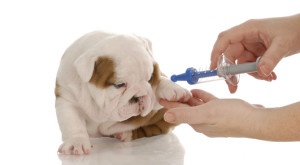Posts Tagged ‘pet boarding’
Why Should I Vaccinate My Pet?
“I figured, what’s the worse that could happen? If he got sick, I’d take him to the vet. Well, he got sick. Real sick. It kills me to think about how scared, how weak he looked, and how despondent my kids were. He was the star of the house. And he was gone, just like that.”
Some days in our clinic, we see this. Clients bringing in their lifeless pets for us to treat and nurse their beloved pet back to health. Sometimes this could have been preventable if only they had vaccinated their pet.
If you have paid attention to the media, there is a lot of discussion on whether you should vaccinate your children or not. Unfortunately, this discussion also crops up in veterinary medicine—whether to vaccinate your pet or not.
There are only two reasons to vaccinate. They are to protect your pet and protect the pets and people around us. Cat and dog diseases still exist and can infect any pet that is not protected. You never know when or where your pet can be exposed. Vaccinations are the best way to stimulate the immune system to stop diseases when exposed and for the vast majority of pets, the benefits of vaccinating far outweigh the risks.
We can’t depend on other pet owners to provide the proper vaccinations to their pets so that our pet has less opportunity to get a disease. So by vaccinating we are cooperating will all individuals to reduce the possibility of spreading disease.
There are several reasons that you should vaccinate your pets. The first and foremost is that with some diseases, it is the law. It is mandatory that you have your pet vaccinated against rabies in every U.S. State. Even pets kept indoors can potentially be exposed if the get out unexpectedly or an uninvited animal gets in the house. The important thing about rabies is that humans can get it and it is fatal.
Several diseases can be transmitted from pets to humans such as rabies and Leptospirosis. Vaccinating your pet helps reduce the risk of human infection and is especially necessary if there are young, elderly, or immune-compromised members in your household.
Many people have their pet groomed, boarded, or attend doggy daycare. If you do, most places require that you pet have a vaccine against kennel cough. This disease is a hacking cough that is highly contagious. Although the disease is relatively mild, it can sometime lead to severe pneumonia.
Young unvaccinated puppies are at risk to contracting parvovirus. This is a severe life-threatening infection that causes bloody diarrhea and vomiting to the point of shock and even death. Parvovirus is extremely contagious and puppies are most at risk. This disease is almost 100% preventable with vaccination.
Puppies can get a severe neurological, dermatologic, and respiratory disease called distemper. Most dogs that contract distemper and euthanized due to the progressive nature of the disease. This disease can also be prevented by timely vaccinations.
There are other diseases such as hepatitis, Lyme disease, and Leptospirosis that can be prevented by vaccinating your puppies.
Believe it or not vaccinating can save money. Most veterinary vaccinations are relatively inexpensive. Vaccinations are definitely less expensive that the cost of treatment for the diseases that they protect against.
An ounce of prevention really is worth a pound of cure. Many dangerous diseases seen in dogs and cats are completely preventable with the right vaccinations. Vaccinating gives pet owners peace of mind and helps pets lead safe and healthy lives.
If you have questions, or are still unsure about vaccinations for your pet, contact our office today.

